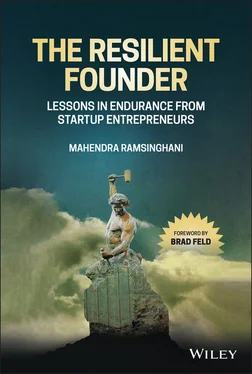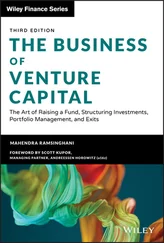Mahendra Ramsinghani - The Resilient Founder
Здесь есть возможность читать онлайн «Mahendra Ramsinghani - The Resilient Founder» — ознакомительный отрывок электронной книги совершенно бесплатно, а после прочтения отрывка купить полную версию. В некоторых случаях можно слушать аудио, скачать через торрент в формате fb2 и присутствует краткое содержание. Жанр: unrecognised, на английском языке. Описание произведения, (предисловие) а так же отзывы посетителей доступны на портале библиотеки ЛибКат.
- Название:The Resilient Founder
- Автор:
- Жанр:
- Год:неизвестен
- ISBN:нет данных
- Рейтинг книги:3 / 5. Голосов: 1
-
Избранное:Добавить в избранное
- Отзывы:
-
Ваша оценка:
- 60
- 1
- 2
- 3
- 4
- 5
The Resilient Founder: краткое содержание, описание и аннотация
Предлагаем к чтению аннотацию, описание, краткое содержание или предисловие (зависит от того, что написал сам автор книги «The Resilient Founder»). Если вы не нашли необходимую информацию о книге — напишите в комментариях, мы постараемся отыскать её.
The Resilient Founder: Lessons in Endurance from Startup Entrepreneurs,
The Resilient Founder
The Resilient Founder — читать онлайн ознакомительный отрывок
Ниже представлен текст книги, разбитый по страницам. Система сохранения места последней прочитанной страницы, позволяет с удобством читать онлайн бесплатно книгу «The Resilient Founder», без необходимости каждый раз заново искать на чём Вы остановились. Поставьте закладку, и сможете в любой момент перейти на страницу, на которой закончили чтение.
Интервал:
Закладка:
The list of all those who failed at suicide is long. Tim Ferriss and Jerry Colonna failed at suicide. They went on and succeeded in many other ways. For one, they lived to talk about their journey and inspire the rest of us.
If suicide is a form of repressed frustration, openness about suicidal thoughts might be a welcome form, a release of sorts. Easier said than done, but after all, we are merely talking about what most of us may have felt at some point or another in life. Just like any other frustration compounded by a mix of emotions. Like love, joy, or sadness. By speaking about our repressed frustrations, we take a step toward relief. We bring it out from within, we stare at it, understand it. How do these frustrations seize our power of judgment, numb us so completely and crush our motivation? When we fail to make peace with reality, and keep ruminating in hopelessness, we get into a downward spiral and an all-consuming negative vortex. Our aspirations fuel us on, but the range of unintended outcomes becomes hard to handle (see Table 2.1).
Table 2-1 Aspirations and Outcomes
| Aspirations | Unintended outcomes |
|---|---|
| Financial freedom | Overwhelmed/overstimulated |
| Problem-solving skills | Feeling adrift |
| Logical processes | Disorganized chaos |
| Self-confidence | Fear, anxiety, and defensive behaviors |
| Adaptability/agility | Rigidity/fear of change/aggression |
| New learnings and growth | Stagnancy and pessimism |
| Enhanced empathy for team members and customers | Inability to understand and express emotions; self-centered/one-sided |
When in such a vortex, the best thing to do is to postpone any plans till tomorrow. And between now and tomorrow, those aching parts inside you – how can you help those gnawing, angry, frustrated parts to be still? Talking about suicide is as easy as chewing glass, but starting with “I am not feeling as good today” may just as well be a starting point.
Dr. Irvin D. Yalom, MD, professor emeritus of psychiatry at Stanford University, often tells his suicidal patients, “There is a part of you that is here today. I want to talk to that part of you …”
You are here today.
And so am I.
And while we are still here, we have to contribute our verse.
O Me! O Life!
-Walt Whitman
Oh me! Oh life! of the questions of these recurring,
Of the endless trains of the faithless, of cities fill'd with the foolish,
Of myself forever reproaching myself,
(for who more foolish than I, and who more faithless?)
Of eyes that vainly crave the light,
of the objects mean,
of the struggle ever renew'd,
Of the poor results of all,
of the plodding and sordid crowds I see around me,
Of the empty and useless years of the rest,
with the rest me intertwined,
The question, O me! so sad, recurring—What good amid these,
O me, O life?
Answer
That you are here – that life exists and identity,
That the powerful play goes on, and you may contribute a verse.
What verse will you contribute?
NOTE
1 1.M. ten Have, B. W. J. H. Penninx, M. Tuithof, S. van Dorsselaer, M. Kleinjan, J. Spijker, and R. de Graaf, “Duration of Major and Minor Depressive Episodes and Associated Risk Indicators in a Psychiatric Epidemiological Cohort Study of the General Population,” Acta Psychiatrica Scandinavica, May 16, 2017, https://doi.org/10.1111/acps.12753
3 How External Events Trigger Negative Feelings
What brings misery to a founder? Competition? Lack of financing? Market acceptance of product? Or the inability to do a hundred small things required each day?
Stressful life events have a substantial relationship with the onset of episodes of major depression, researchers proclaim, as seen in Table 3.1. A start-up life includes a generous dose of depressive triggers; loss of job occurs by design or default. There is neither a financial cushion nor a predictable drip of a salary each month. All founders have faced financial problems, be it personal or be it payroll. Or legal hassles. Marital challenges are not too far behind.
But here is the counterintuitive part: about one-third of the association between stressful life events and onsets of depression is noncausal, since “ individuals predisposed to major depression select themselves into high-risk environments.” 1 Put differently, we throw ourselves into high-risk environments to feed our innate tendencies. Is it the start-up life that leads us to a depressive episode, or is it our predisposition that puts us in such a situation?
Table 3-1 External Events and Depression Triggers
| Life Events | Odds that such events trigger depression | |
|---|---|---|
| Month of event | Three months after the event | |
| Job loss | 3.95 | N/A |
| Legal problems | 3.81 | 10.81 |
| Work problems | 2.44 | 2.74 |
| Financial problems | 5.85 | 2.36 |
| Divorce | 5.22 | N/A |
| Marital problems | 8.39 | 4.29 |
| Assault | 25.36 | N/A |
( Source: K. S. Kendler, J. Kuhn, and C. A. Prescott, “The Interrelationship of Neuroticism, Sex, and Stressful Life Events in the Prediction of Episodes of Major Depression,” American Journal of Psychiatry 161, no. 4 (2004): 631–636.)
PERSISTENCE: THE DOUBLE-EDGED SWORD
In The Theory of Moral Sentiments, economist Adam Smith writes, “The great source of both the misery and disorders of human life, seems to arise from overrating the difference between one permanent situation and another.”
Adam Smith is asking us to take another look at our own situations and probably saying, maybe it's not that bad. Maybe we are overrating it. Maybe this hopelessness, maybe this terrible situation should be perceived differently. He reminds us that a founder has to disturb the peace of society to achieve their outcomes. ”The person under the influence of any extravagant passions, is not only miserable in his actual situation, but is often disposed to disturb the peace of society, in order to arrive at that which he so foolishly admires.”
And he adds that “none of them can deserve to be pursued with that passionate ardor which drives us to violate the rules either of prudence or of justice; or to corrupt the future tranquillity of our minds …” In the quest of innovation and pursuit of extravagant passions, entrepreneurs can make themselves and others miserable. The mantra of persistence is often chanted at the expense of immense sacrifices. Persistence – a noble virtue – can even become a source of misery.
Persistence was my superpower. But now I've come to understand that persistence is a double-edged sword, and my decision not to take a break, to not take more off my plate, hurt me, my family, and the company. That was the biggest mistake of my career.
– Ryan Caldbeck, CEO, CircleUp 2
FOUR TYPES OF STRESSORS
In a survey on emotional resilience conducted by Jonny Miller and Jan Chipchase, the authors found that four types of stressors play out in a founder's life (see Figure 3.1): those driven by external and very precise events (losing a client, shortage of cash), and others driven by internal and ambient triggers (such as imposter syndrome).
Читать дальшеИнтервал:
Закладка:
Похожие книги на «The Resilient Founder»
Представляем Вашему вниманию похожие книги на «The Resilient Founder» списком для выбора. Мы отобрали схожую по названию и смыслу литературу в надежде предоставить читателям больше вариантов отыскать новые, интересные, ещё непрочитанные произведения.
Обсуждение, отзывы о книге «The Resilient Founder» и просто собственные мнения читателей. Оставьте ваши комментарии, напишите, что Вы думаете о произведении, его смысле или главных героях. Укажите что конкретно понравилось, а что нет, и почему Вы так считаете.












